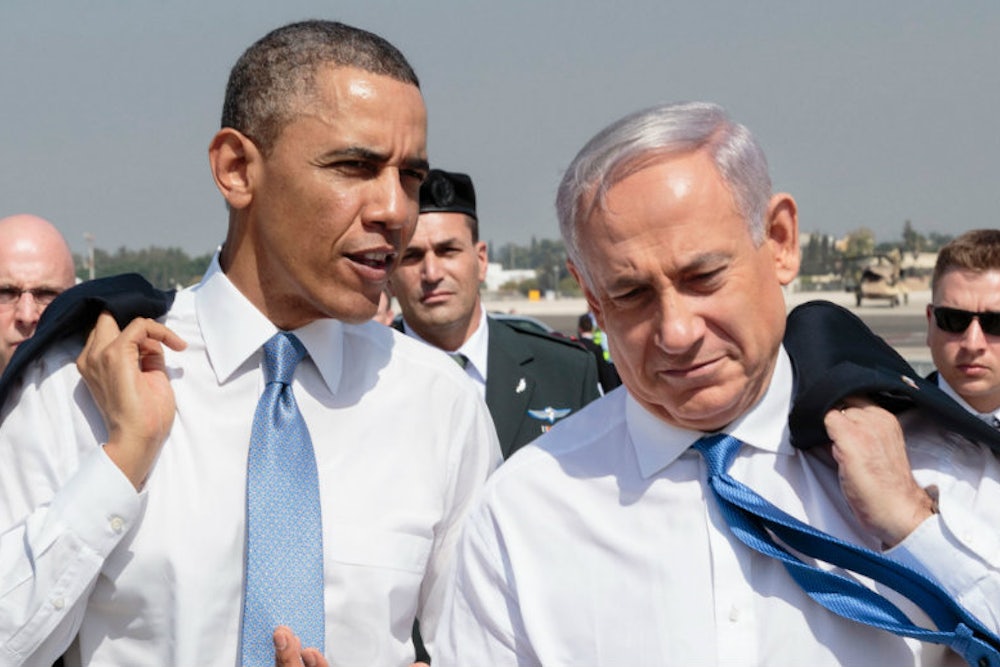On Tuesday, Israel’s Channel 1 ran a supposed transcript of a phone call between President Barack Obama and Israeli Prime Minister Benjamin Netanyahu. Very quickly, the transcript, which the Channel 1 reporter claimed to have received from “American sources,” was rejected as fake by Israeli and American officials. The American National Security Council and the office of Israel’s prime minister even released identical tweets expressing shock and disappointment that “someone would sink to misrepresenting a pvt convo between POTUS and PM.” Nonetheless, the content of the fake transcript is instructive: In fooling Channel 1, the fabricators laid bare Israeli fears that the Obama administration doesn’t really support Israel in its struggle against Hamas.
In the supposed transcript, Obama insists that the Israelis implement an immediate unilateral ceasefire, in exchange for merely the “belief” that Hamas would cease its rocket attacks; insists that Hamas–friendly Qatar and Turkey serve as mediators; and informs Netanyahu that he has no say in the matter. Obama’s tone is haughty and domineering, and he is completely unsympathetic to Israel’s strategic position or security needs. Although the transcript appears to be made up—the lowest form of mischievous political nonsense—it also happens to track closely with the frantic voices we’ve been hearing from the Israeli media.
This past week, the Times of Israel’s relatively moderate editor, David Horovitz, labeled Secretary of State John Kerry's recent ceasefire attempt “a betrayal” motivated either by “ineptitude, malice or both.” Ari Shavit and Barak Ravid, respected leftist journalists from liberal outlet Haaretz, characterized Kerry’s efforts as “catastrophic” and explained that Kerry’s recent proposal "might as well have been penned by Khaled Meshaal"—Hamas’s leader. And Shmuel Rosner, an Israeli journalist and occasional contributing opinion writer for The New York Times, seriously engaged the possibility that Kerry “believes Hamas has the better case in this conflict” or simply “finds it necessary to listen to Qatar-Turkey.” These are not nutty pundits; all four are respected in the West and fall well within the Israeli mainstream. It is no accident that this transcript seems precisely designed to confirm mainstream Israeli fears about Kerry—and even shift the focus up the ladder, from the secretary of state to the president.
And the thing is, these pundits—and yes, the transcript fakers too—are onto something. The Arab and Islamic worlds are not only caught in an explosion of Sunni-Shia violence in Syria and Iraq, but an intra-Sunni power struggle that sets Qatar and Turkey against Sisi’s Egypt and Saudi Arabia. Hamas on the one hand, and Israel and the Palestinian Authority on the other, are becoming something like proxies in that larger fight. And for all of Obama’s statements of support for “Israel’s right to defend itself,” Israelis see a president who is extremely averse to taking sides in this intra-Arab power struggle, even on behalf of American interests. Perhaps the president’s posture of neutrality (or even withdrawal or absence) is the right call in general, but to many, this posture seems twisted when it gets in the way of backing close allies or acting on moral imperatives.
But even leaving aside the Obama administration’s broader Middle East strategy, the Israeli media’s rapid acceptance of the transcript shows just how little it expects of relations between Obama and Netanyahu. And who can blame them? When senior Israeli officials start labeling Kerry “messianic” or accuse him of “a strategic terror attack,” a haughty Obama who browbeats Netanyahu and brushes aside his concerns doesn’t seem all that farfetched. On that score, however, one would hope the Israeli public directs some pointed questions at its current political leadership. Good will and credit with America are crucial for small allies—and especially Israel. And with this president, Netanyahu may already be in the red.
